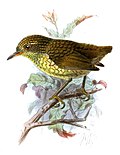| Antpipit | |
|---|---|
 | |
| Southern antpipit (Corythopis delalandi) | |
| Scientific classification | |
| Kingdom: | Animalia |
| Phylum: | Chordata |
| Class: | Aves |
| Order: | Passeriformes |
| Family: | Tyrannidae |
| Genus: | Corythopis Sundevall, 1836 |
| Type species | |
| Myiothera calcarata Wied-Neuwied = Muscicapa delalandi Lesson, RP, 1831 | |
The antpipits, Corythopis, are a genus of South American birds in the tyrant flycatcher family, Tyrannidae. They are long-legged species that spend most of the time on the ground, which caused them to be placed incorrectly in other taxa. [1]


